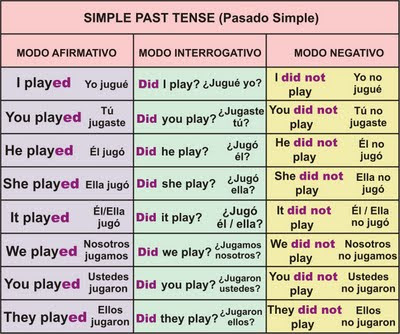
Present Perfect - Use
1) Result of an action in the past is important in the present
I have cleaned my room.
2) Recently completed action
He has just played handball.
3) Action beginning in the past and still continuing
We have lived in Canada since 1986.
4) Together with lately, recently, yet
I have been to London recently.
Signal words
just, yet, never, already, ever, so far, up to now, recently, since, for
Present Perfect - Form
We form the Present Perfect with have and the past participle (regular verbs: infinitive + -ed; irregular verbs: 3rd column of the table of the irregular verbs)
have/has + past participle
has: 3rd person singular (he, she, it)
have: all other forms
Affirmative sentences
regular verbs
irregular verbs
I/we/you/they + have played football.
I/we/you/they-+ have gone to the supermarket.
He/she/it+ has played football.
He/she/it + has gone to the supermarket.
NOTE: We use has in the 3rd person singular (he, she, it).
Negative sentences
regular verbs
irregular verbs
I/we/you/ they + have not played football.
I/we/you/they + have not gone to the supermarket.
He/she/it + has not played football.
He/she/it + has not gone to the supermarket.
NOTE: We use has in the 3rd person singular (he, she, it).
Questions
regular verbs
irregular verbs
Have +I/we/you/they playedfootball?
Have+ I/we/you/they gone to the supermarket?
Has + he/she/it played football?
Has +he/she/it gone to the supermarket?
NOTE: We use has in the 3rd person singular (he, she, it).





